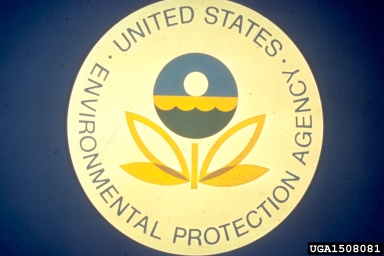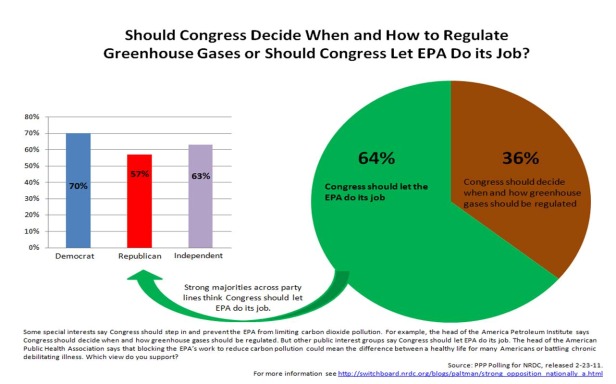Cross-posted from the Natural Resources Defense Council.
Just days after a series of budget votes in the U.S. House, which NRDC Executive Director Peter Lehner called “an unprecedented assault on public health, clean air, fresh water, open space and wildlife,” NRDC is releasing 20 new polls to probe how Americans nationally and in 19 key districts feel about votes to block the EPA’s work to protect public health.
The new results are consistent with what we’ve found in previous polls and the American Lung Association showed just last week, Americans want the EPA to be able to do its job. They don’t want the politicians in Congress making decisions about how and when to reduce pollution; they trust the scientists at the EPA to protect public health.
Nationwide, nearly six out of 10 Americans (58 percent) — including 55 percent of Independents and about half (48 percent) of Republicans — oppose the U.S. House vote to “block the EPA from limiting carbon dioxide pollution,” according to the survey of 784 registered voters conducted Feb. 18-20, 2011 by Public Policy Polling for NRDC. My colleague Dan Lashof blogged on the bad votes, which have nothing to do with cutting federal spending, a few days ago.
Not only do Americans oppose Congress blocking the EPA, more than two thirds of Americans (68 percent) — including 54 percent of Republicans and 59 percent of Independents — said the EPA should move ahead to “reduce carbon pollution without delay.”
It should be clear by now that carbon dioxide is a serious public health concern — just look at these statements from leading health organizations including the American Lung Association — about congressional efforts to block EPA. In fact, the American Lung Association called the House-passed budget bill “toxic to public health.”
Speaking of toxic, the polling we are releasing today also found that 66 percent of Americans support “requiring stricter limits on the amount of toxic chemicals such as mercury, lead, and arsenic that coal power plants and other industrial facilities release,” a finding that is particularly timely as the EPA is issuing badly-needed standards to clean up toxic pollution from thousands of industrial plants today.
We also looked at 19 congressional districts in eight states. Here’s a table with all of the top-line results [PDF], and here’s a zip file with the full reports for each poll. The national news release is here [PDF] and news releases specific to each district are linked in the list below [All PDFs]:
Illinois: Reps. Joe Walsh (R), Robert Dold (R), and Bobby Schilling (R)
Michigan: Reps. Daniel Benishek (R), and Mike Rogers (R)
Minnesota: Reps. Michele Bachmann (R), and Chip Cravaack (R)
Montana: Rep. Denny Rehberg (R)
Ohio: House Speaker John Boehner (R), and Reps. Patrick Tiberi (R), and Jim Renacci (R)
Pennsylvania: Reps. Jason Altmire (D), Jim Gerlach (R), Patrick Meehan (R), Lou Barletta (R)
Virginia: Reps. Robert Hurt (R), Scott Rigell, (R)
Wisconsin: Reps. Reid Ribble (R), and Sean Duffy (R)
In all these districts, we found that respondents across the political spectrum said they oppose their representative’s votes to handcuff the EPA and think instead that Congress should let the agency do its job of protecting public health and the environment.
The national survey of American registered voters also showed the following:
- 69 percent of Americans — including 59 percent of Republicans and 69 percent of Independents — think EPA scientists, not Congress, should decide what pollution limits are needed.
- 64 percent of Americans — including 57 percent of Republicans and 63 percent of Independents — think “Congress should let the EPA do its job” versus “Congress should decide when and how greenhouse gases should be regulated,” which was favored by only about a third of Americans (36 percent).
The congressional district numbers and reports are all pretty consistent with the national findings. They are all fascinating, but the results in House Speaker John Boehner’s district are particularly interesting. Boehner is obviously a critical player in undoing the public health protections we rely on for clean air and water. So what do his constituents think of all this?
Fifty-six percent of Boehner’s own constituents oppose the U.S. House vote to “block the EPA from limiting carbon dioxide pollution” and 62 percent say the EPA should move ahead to “reduce carbon pollution without delay.” Additionally,
- 66 percent of Boehner’s constituents think “Congress should let the EPA do its job” versus “Congress should decide when and how greenhouse gases should be regulated,” which is favored by only about a third of Boehner’s constituents. The support for Congress letting EPA do its job spans party lines — 56 percent of Republicans and 60 percent of Independents support this view.
- 65 percent of Boehner’s constituents favor the EPA requiring stricter limits on the amount of toxic chemicals such as mercury, lead, and arsenic that coal power plants and other industrial facilities release, including 54 percent of Republicans and 61 percent of Independents.
The message from all this polling is as clear as clean air: In every district we polled, Americans want their elected representatives to let the EPA do its job instead of putting the profit-driven agenda of big polluters ahead of the health of their children. Politicians who are considering blocking the EPA and updates to clean air safeguards should understand that doing so is very unpopular. Americans know where these actions will lead and they want their kids to be able to grow up breathing clean air.





